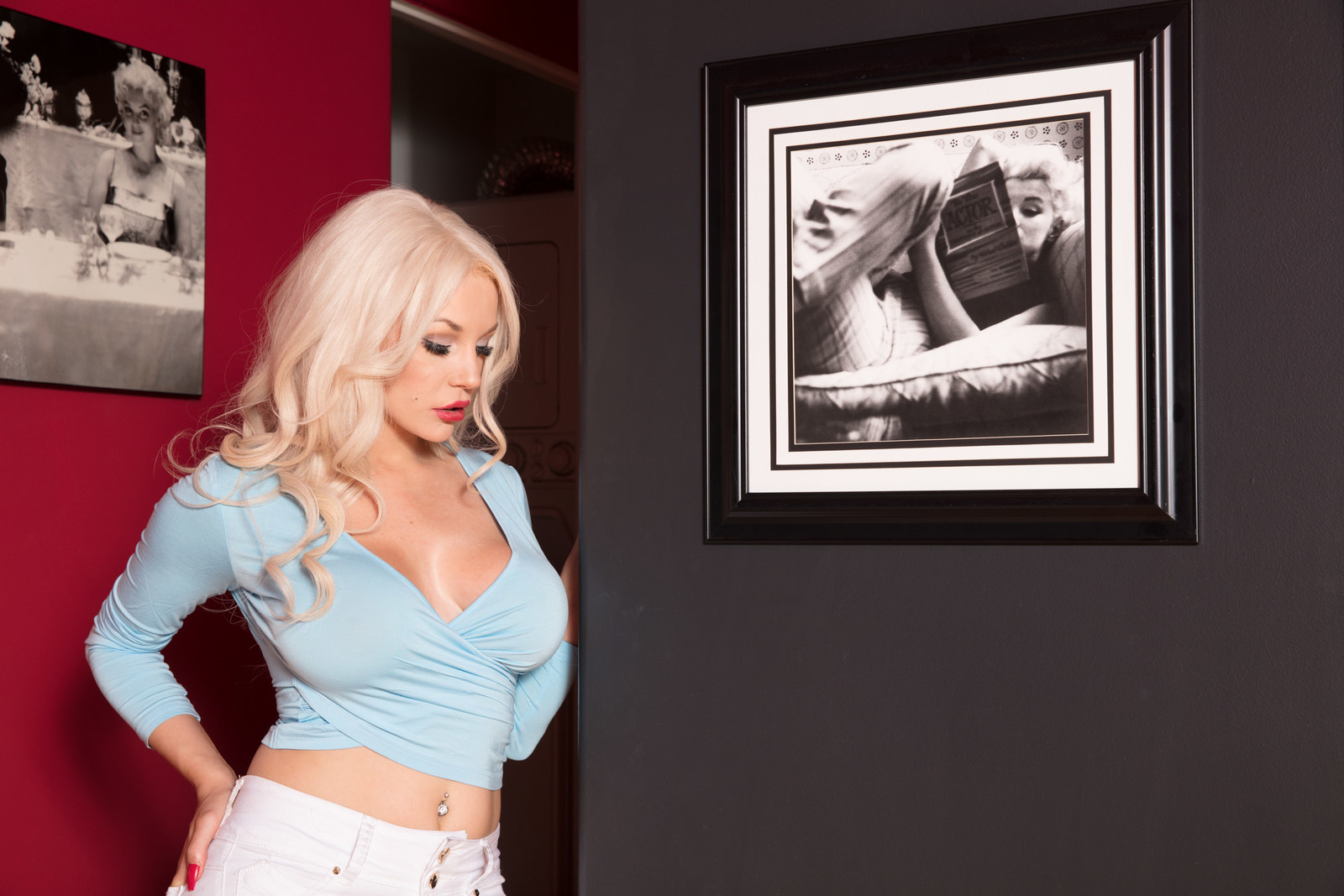Courtney Stodden’s Hollywood Hills home is haunted by the ghost of Marilyn Monroe. Stodden has only been in the house for two months, and there are still unpacked boxes waiting to be opened. But other than her 39-year-old boyfriend and manager Chris Sheng, their three yappy dogs (Cartier, Cupcake, and Cappuccino), one very shy cat (Casanova), a cotton candy machine on the bottom floor, and a rotary phone in the foyer, everything in her home feels like an object of devotion in a makeshift shrine.
A giant topless portrait of Marilyn faces the stripper pole that bisects the living room, where two coffee table books about the actor are on display. A framed photo of Marilyn at a restaurant table hangs in the kitchen (with a duplicate hanging just two feet away), alongside a photo of Marilyn reading a book about acting, while a Marilyn Barbie and a Marilyn cross-stitch sit behind a glass-door cupboard in the dining room.
This wouldn’t surprise anyone familiar with Stodden’s Instagram, which for years has also been filled almost exclusively with a kind of Marilyn cosplay, albeit a more buxom and blatantly sexy version. Stodden’s recently gained a bit of weight, intentionally — though she’s still teeny tiny — giving her more hips and butt in addition to her surgically enhanced chest, sending her into full pinup territory. (Though, lately, she seems to be channeling a late-era Britney Spears, with piecey long blonde hair and sparkly chokers.) And she’s been open about the way she idolizes the actor, writing in a letter she put on Marilyn’s grave in 2016, “You’re in my heart and my very nature.”
“I find strength in her, and it’s not the image,” the 24-year-old says while perched atop a mountain of cream-colored pillows in her bright but still-sparse living room. “There’s so much more than meets the eye, and I connect so much with that. I’ve created this image, this alter ego, which is Courtney Stodden, the bubbly persona who marries old men. It’s stupid, it’s silly, it’s funny, it’s sexy.”
You might only have a vague memory of why you recognize Courtney Stodden’s name. Here’s a reminder: In 2011, when she was just 16 years old, she married The Green Mile actor Doug Hutchison, who was 51 at the time. Their wedding photos tell you most of what you need to know about the couple, with Stodden towering over her new husband in lucite platform heels and a tight white minidress, blonde hair cascading down her back, and Hutchison’s face pressed into her formidable bosom. Although Stodden looks markedly older than a teenager, thanks to layers of makeup and a body that seems to belong to someone long past their adolescence, the age difference is immediately clear.
“Where’s her mom, where’s her dad, and who is this guy? It’s fucking crazy!”
Looks aside, Stodden was still a child bride who needed (and received) the consent of her parents to marry in Nevada, where the legal age of marriage is a mere 16. Her mother signed off on it, her father walked her down the aisle, and Stodden and Hutchison went viral and became immediate tabloid fixtures — a kind of national freak show. “Teen Bride Courtney Stodden Talks Wedding Night: ‘I Was Aroused For 24 Hours Straight,'” said Radar Online at the time. Celebitchy said Stodden looked like “a cat in its first heat.” (Stodden was a virgin before she married Hutchison.)
The couple eventually appeared on ABC News to tell the world their love was real, or, as Stodden put it in her Valley Girl accent, “rill.” As real as the love between any 16-year-old girl and her middle-aged husband seemingly skirting California’s statutory rape laws could be. (Hutchison, through his management, declined to be interviewed for this story without “an offer for substantial compensation.”)
The marriage lasted a lot longer than most people would’ve guessed; Stodden didn’t file for divorce until seven years later. (She says it took her two years to even figure out how to file the paperwork.) And in the years she was married to Hutchison, Stodden made a sort of career out of her own notoriety: She was a cast member on Couples Therapy With Dr. Jenn (with Hutchison), The Mother/Daughter Experiment: Celebrity Edition (with her stage mom/once-manager mother), and Celebrity Big Brother in the UK (on her own). She was a PETA spokesperson for going vegan (which she no longer is), and a covergirl for Girls and Corpses magazine. But she also opened up about how hard it was to be criticized by a cruel public nearly constantly, about her miscarriage and her sexual assaults, about her depression and mental health.
Whether you think she was just a foolish young girl seduced by the chance to be famous and sold out by parents who wanted to be adjacent to that fame, or an abuse victim with no agency, or the knowing architect of her own creepy narrative, Stodden was roundly mocked for years by a public waiting for her 15 minutes to be up. Tabloids have called her “worse-for-wear,” a “fame whore,” a “regular whore,” suggested she’s secretly a 40-year-old woman, mocked her for her hypersexuality, for having her period, and depending on the day, for being too fat or too skinny. The American public seemed remarkably comfortable sneering at a 16-year-old who married someone old enough to know better, and Stodden grew up in a kind of media wasteland where the easy and seemingly reasonable thing to do was to call her a dumb slut.
The way Stodden was treated as a punchline makes some sense when you look at her and Hutchison in any photo from 2011, or listen to them in any interview. There’s no response other than laughter when you see this clearly staged paparazzi photo shoot at a pumpkin patch, where she’s wearing knee-high white go-go boots and her aged husband is wearing...cargo shorts? (Come on, Doug, get it together.) They look completely mismatched and absurd together, and Stodden knows it. “If I was now, looking back on this, I would be concerned! Where’s her mom, where’s her dad, and who is this guy?” she says. “It’s fucking crazy!”
Now, at 24, Stodden — who was tabloid fodder before she was old enough to legally smoke, vote, or drink — is an almost-divorced, vaguely recognizable reality show professional who has burned through more money in a few years than most of us see in a lifetime. And she wants something else for herself: an identity and sense of self where she’s actually in control. After all, other women in the public eye who have been shamed or abused in years past are beginning to see reconsiderations of their legacies all over the place — and why shouldn’t she?
“I’m trying to turn a new leaf. I’m coming to the surface. Me. No one else. Not this,” she says, pointing to the nude portrait of Monroe in her living room.
She’s working on a pop album, tentatively called Courtney Rx, after releasing a string of songs and one album under the pseudonym “Ember,” and she tells me that music — not her troubled marriage, or all the televised fighting, or playing a sexy-but-wounded bird — is her real calling. But how do you establish yourself as an artist, or figure out who you really are, or even try to reckon with what your image once was, when the public still treats you as nothing more than a walking dumb-blonde joke?
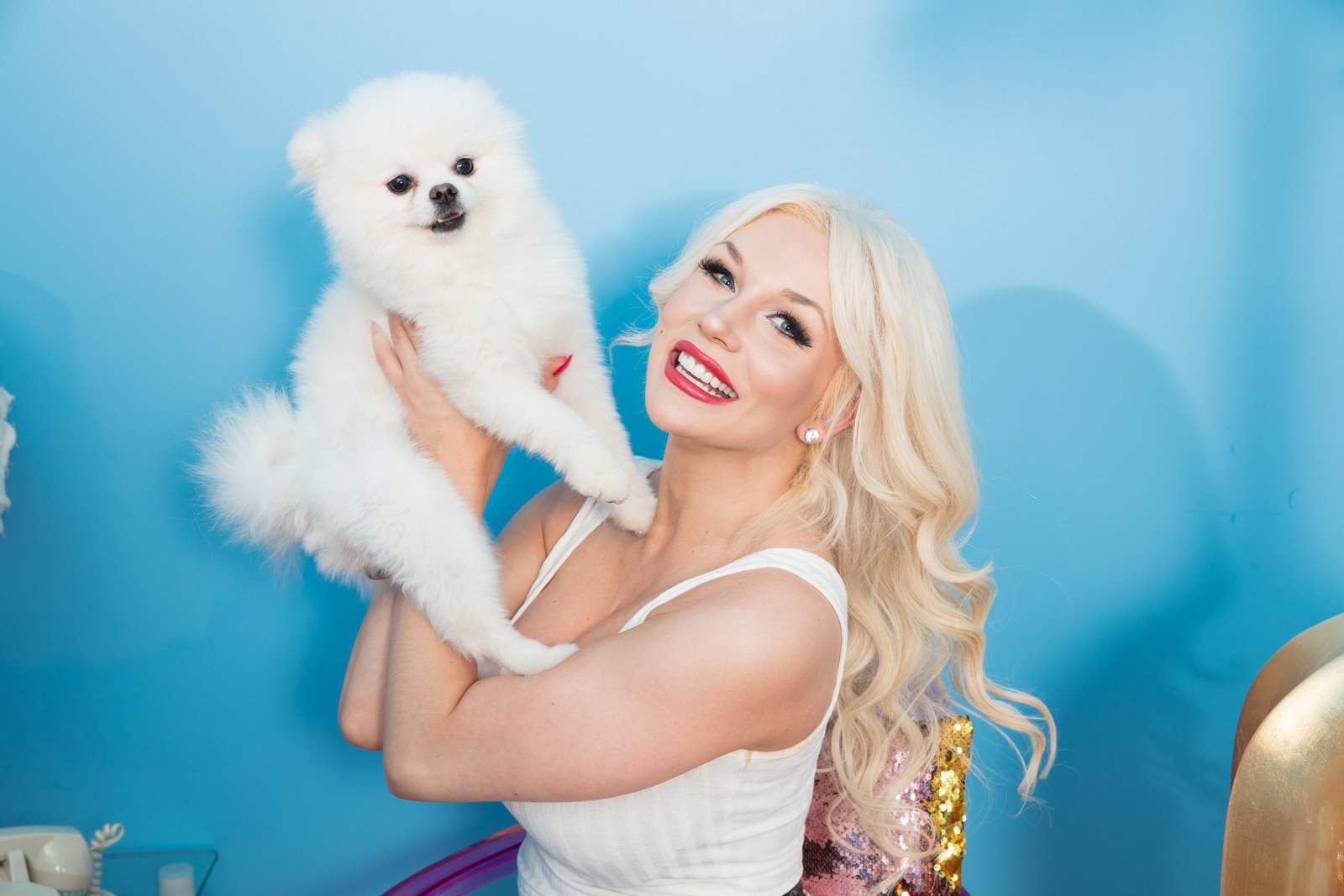
Courtney Stodden is hardly the first Hollywood woman to idolize Marilyn Monroe to the point of mimicry. Remember Lindsay Lohan on the cover of New York magazine, Megan Fox’s forearm tattoo (now removed), Madonna in the “Material Girl” video, Anna Nicole Smith in the white dress, Christina Aguilera for the entirety of the mid-2000s, Scarlett Johansson for Dolce & Gabbana, and Mariah Carey imitating Marilyn’s 1954 performance for US troops in Korea in the “I Still Believe” video? Marilyn will forever be a compelling character study for women of a certain age fascinated by her beauty, her untimely death, and how men seemingly fell to their knees at her throne.
But that famous quote often attributed to Marilyn — “A wise girl kisses but doesn’t love, listens but doesn’t believe, and leaves before she is left” — only sounds empowering until you’re old enough to realize they’re the words of an eternally lonely and depressed young woman who may have killed herself, intentionally or otherwise. While Stodden certainly romanticizes Marilyn, she says she actually keeps her around as a reminder of how very wrong it can all go: the trauma, the pills, and having your narrative consumed by the men around you. “It reminds me to remain cautious. I want to live and be happy and be free. I need to be vulnerable and learn how to coexist with fame.”
For years, Stodden was the opposite of cautious with how she courted fame, and it certainly seems like she’s suffered for it. But while I might call what happened to her trauma, and where I might have said the real-life power dynamic between Stodden and her much-older husband was disturbingly clear, Stodden is less black and white. She’s still unwilling to hold those who had more power than she did accountable — including Hutchison.
“I know that I love him so much, and I think he’s also ingrained in me because I was 16. He has his thumbprint all over my spirit, and that part is hard for me to grow out of. He’s in my identity,” she says. “If he wasn’t the person he is, I would say absolutely he took advantage of me. But the situation was so unique, right or wrong.”
Stodden and Hutchison separated multiple times during their marriage, hashing out their disputes online or in tabloid interviews. And now, even as their divorce is being finalized, they’re still regularly in touch. (One thing is settled, however: Their shared dog, Dourtney, lives with Hutchison full time.) As we talk, Stodden’s phone lights up with a text. It’s Hutchison.
“I knew it was controversial. I knew it would be hard to get people to accept it,” she says of their marriage. “But I had no reason to be prepared for what happened.”
“He has his thumbprint all over my spirit, and that part is hard for me to grow out of.”
If you watched Stodden on any number of reality shows she appeared on, you know all about her mother, Krista Keller. Stodden and Hutchison first connected when Keller contacted Hutchison about potentially enrolling Stodden in an acting class he taught in LA, while Stodden and Keller were still living in Washington. How this professional relationship turned romantic is still unclear, but Stodden says that her mother, Keller, monitored all her email conversations with Hutchison.
“I had no idea how old he was,” Keller tells me over the phone. “Courtney was 16 going on 35. They just really hit it off. It’s just one of those things.” Hutchison and Stodden never even met in person before they decided to get married — an unambiguous way to make it clear to the authorities, perhaps, that there was no sexual contact between the two before marriage. “It was almost a legal matter for me when I signed off on it,” Keller says. “I knew she could’ve just left and done what she wanted to do.”
These emails are apparently how the two first fell in love, though Hutchison has claimed that he didn’t know how old Stodden actually was until late into their email courtship. And then there was a strange, additional complication: According to Stodden, this correspondence occurred during a particularly rough period in her parents’ relationship, and her mother began to fall for Hutchison herself.
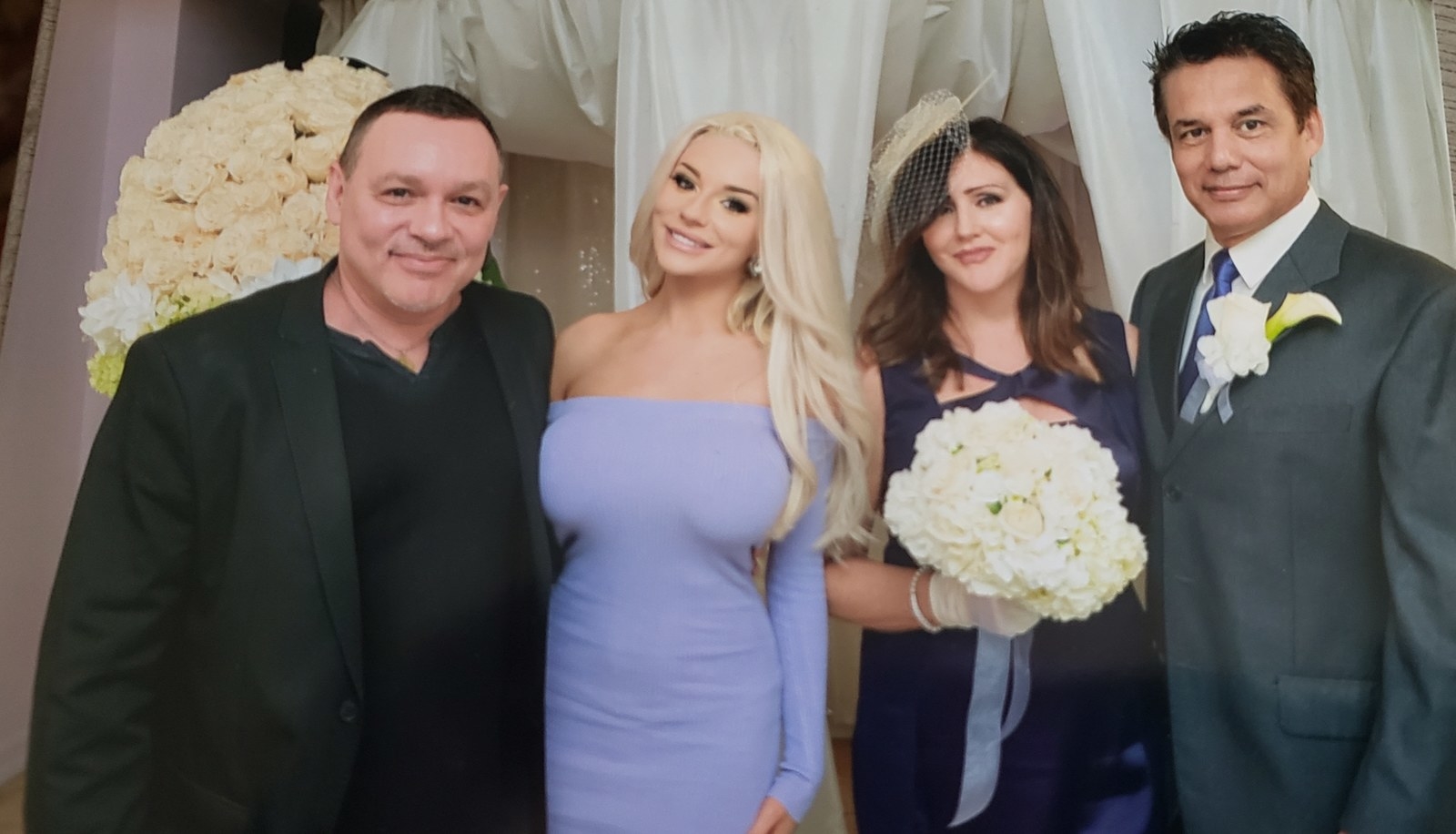
“She has always said we’re like Siamese twins, she can feel what I feel,” Stodden says. “She fell in love with him through me.” Keller claims this is untrue, saying that she became Hutchison’s confidante after his marriage to her daughter since they were of similar ages and could relate to each other better than, maybe, a 51-year-old and a 16-year-old could. Nonetheless, Keller is clear that she gave Hutchison her approval to marry Courtney. “I didn’t really have a lot of authority over what Courtney wanted to do,” her mother says.
Their perplexing dynamic was explored when Stodden and Keller appeared on The Mother/Daughter Experiment: Celebrity Edition in 2016, when Stodden was 21 years old. And while most reality show plotlines are exaggerated for maximum effect, this one, according to Stodden, was unfortunately very real.
“That was really my fucked life,” she says. On the show, Stodden accused her mother of trying to steal her husband, which she denied. Hutchison also made an appearance, brutally telling Keller that he didn’t find her attractive in any way whatsoever, and denied having an emotional affair. Stodden sat and watched the two grown-ups at the center of her life fight, her eyes wet with tears.
Stodden and her mother have since reestablished their relationship, but the truth of Stodden’s teenage years is unavoidable: Keller encouraged and signed off on Stodden’s marriage, and helped propel her into the public eye. “She was full-throttle: Oh my god, this is your moment,” Stodden says. “She’s always loved Hollywood, and when I expressed interest, it was like instant euphoria.”
At the height of her fame, Stodden says she was earning six figures for reality TV appearances and five figures for television interviews, work that she felt compelled to do since Hutchison had become a pariah in the industry (and beyond) and couldn’t get a job. It’s not work she loved, either, but it’s work she had to do to keep the household afloat. “It’s not just a paycheck,” she says. “It’s bloodsucking.”
Stodden says that her father, Alex Stodden, was in and out of her life, emotionally distant, and is now unwilling to have a relationship with her because of her marriage. “The main foundation that’s shaky is my father,” she says. “He would get very angry. Just, you know, a man screaming. He would just scream at my mom, they’d fight a lot. It wasn’t physical but mental and emotional.” (Keller corroborates Stodden’s description; Stodden’s father did not respond to multiple requests for comment.)
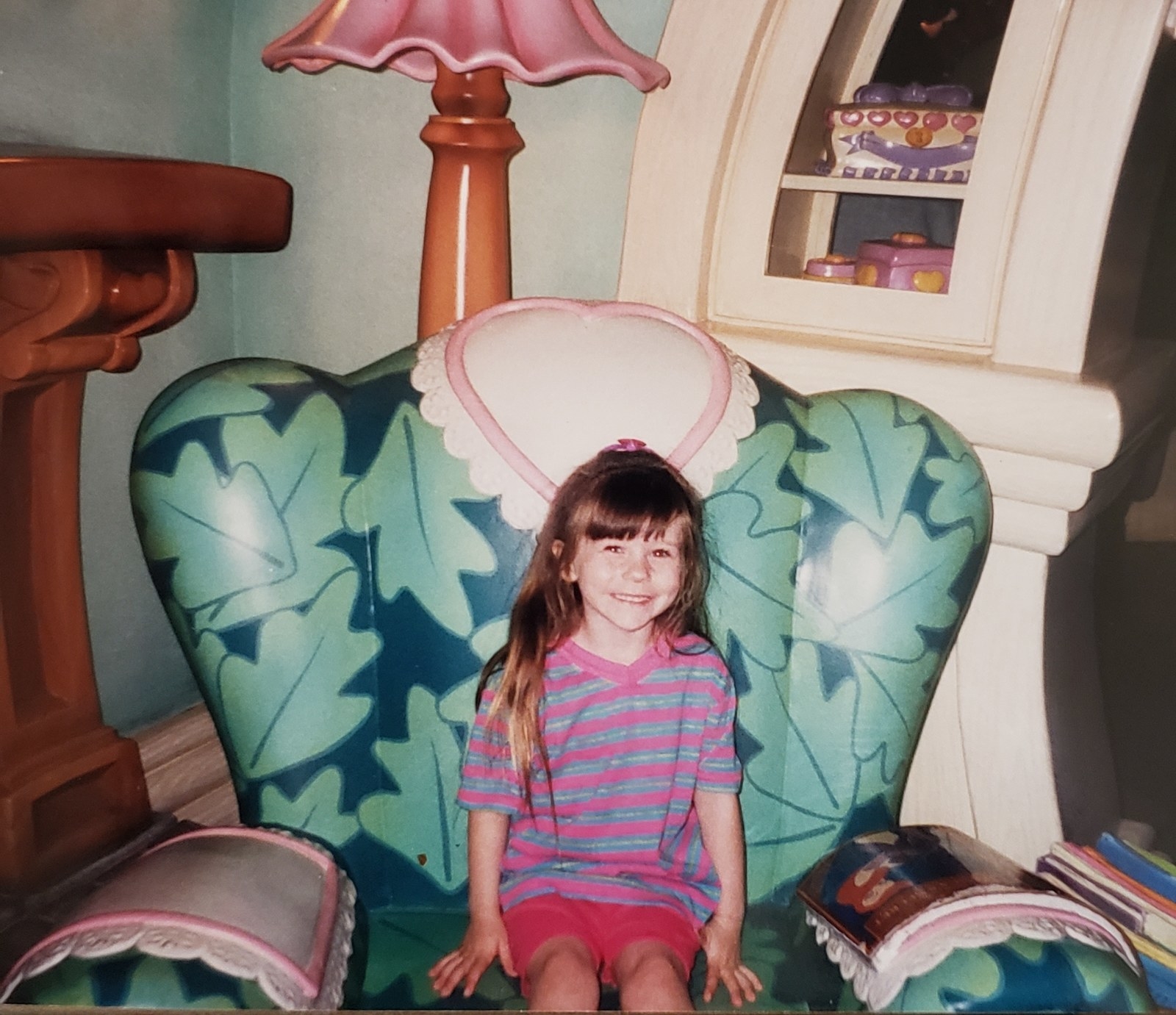
Stodden’s parents divorced a year after she married Hutchison, and both are now remarried, her mother in Los Angeles and her father in San Diego. Stodden says she and her father are no longer in touch.
“I think he wants me to be a totally different person,” Stodden says. “I had a really bad night one night, it got really dark because I deal with depression, and it got really bad and I was frantically texting him. He didn’t write me back. But other guys do, right? Other daddies do.”
Drawing a direct line between her feelings about her father and her romantic relationship with a significantly older man might look too neat, but it also seems like the truth. “I felt like I needed a father figure in my life. It stems a lot from that relationship,” she says. “It’s obvious, though. You can google me and figure it out.” After all, she released a single about it.
Stodden says her childhood became unpleasant as soon as she started to go through puberty. She was raised in a small coastal town in Washington called Ocean Shores, with a population of just over 5,500 people. When she developed breasts (she says she used to wear extra-thick push-up bras to create the illusion of implants when she was still a teenager) and started wearing frosted makeup, she noticed that she started getting more and more attention, and says she felt the town turn on her. “It was like, Oh my god, this bitch,” she says. “This town was very chill and I walked in looking like Pamela Anderson.”
Predictably, a lot of the attention Stodden received was from older men, and it still makes her uneasy. “I was a kid and I looked like an adult. It was confusing,” she says. “Now that I’m an adult, I realize I’m not just a body. I’m a human being. I’m a good woman.”
As I talk to her, I’m surprised by Stodden’s levelheaded perspective on her past — that she’s healthy enough to have insight on her own disorienting life history is impressive — and, honestly, that she has any sense of self-awareness at all. People older than her, eaten by the celebrity machine in kinder ways, have come out with less of an understanding of what happened to them and why they made the choices they did.
“Now that I’m an adult, I realize I’m not just a body. I’m a human being. I’m a good woman.”
At one point, I ask her about the ABC News interview with Hutchison that was her first taste of international fame, and the public’s first experience seeing the kind of sexy baby impression Stodden would end up doing in public for years to come. In the six-and-a-half-minute interview, Stodden gazes at her new husband in what appears to be her best attempt at seduction, which ends up looking like her face is spasming. First, she juts her tongue out, licking her lips, pouting them while her head rolls around like it’s going to fall off her neck. She bares her teeth and her eyes flick up at Hutchison’s face and then down to his chest like she’s a lion eyeing a snack.
Stodden buries her face in her couch cushions and screams when I bring it up. “I was like, okay, if I’m nervous, I’m gonna just do something crazy. It just happened. It was so crazy. [A] horny, panic response. When you’re nervous, just get horny.”
She also says, on some subconscious level, she was just trying to channel Marilyn. “It’s almost like that Marilyn Monroe story where she’d put on her red sweater and she’d turn into this different woman, she was very sexy and sexual, and she was a kid,” Stodden says. As legend has it, a junior high school student named Norma Jeane Mortenson once wore her red cardigan backward, and it transformed her into the beautiful and buxom Marilyn who became a worldwide celebrity. “That’s exactly what I was doing,” Stodden says. She says she thought that if she looked or acted a certain way, “They won’t know I’m nervous. They won’t know I’m a kid. They won’t know anything.”
In Stodden’s version of the story, the reasons why she married Hutchison were separate from wanting to make a name for herself. She was trying to become a singer when they met, but she says her biggest — okay, only — hit, “Don’t Put It On Me,” was online before she ever married Hutchison, and the video went viral after the wedding, much to her current humiliation. (She says she plans on rerecording the song for her upcoming album. “We’re not gonna do it in a swamp this time,” she adds, laughing.)
Already dealing with tumult in her family life, humiliated at school because of how she looked (she dropped out and finished high school through an online Christian academy), Stodden saw Hutchison as a way out of her miserable life. She also notes that he was just one of a few significantly older adult men pursuing her when she was a teenager.
“At 15, I had police officers writing me from Texas to get to know me and marry me,” she says — men who noticed the photos and videos she posted online. Adult men who worked with her half-sisters were interested too, and she points out that they all knew how young she was. The luck, then, wasn’t that Hutchison wanted to marry her, but rather that she loved him deeply and figured he was a way out of her circumstances. If Hutchison hadn’t come along, she says, she likely would have run away from home regardless.
Throughout our day together, Stodden plays old episodes of I Love Lucy on repeat in the background, on mute. “It makes me feel like I have a really good family,” she says. It’s one of the shows she watched with her mother, an old comfort, a glimpse into what her life could’ve been in some other universe: Stodden, a doting but eccentric wife, happy and in love with her Hutchison.
“He was a safety net. There were other guys way richer than him,” she says. “I just fell in love with him. He was everything. He was everything.”
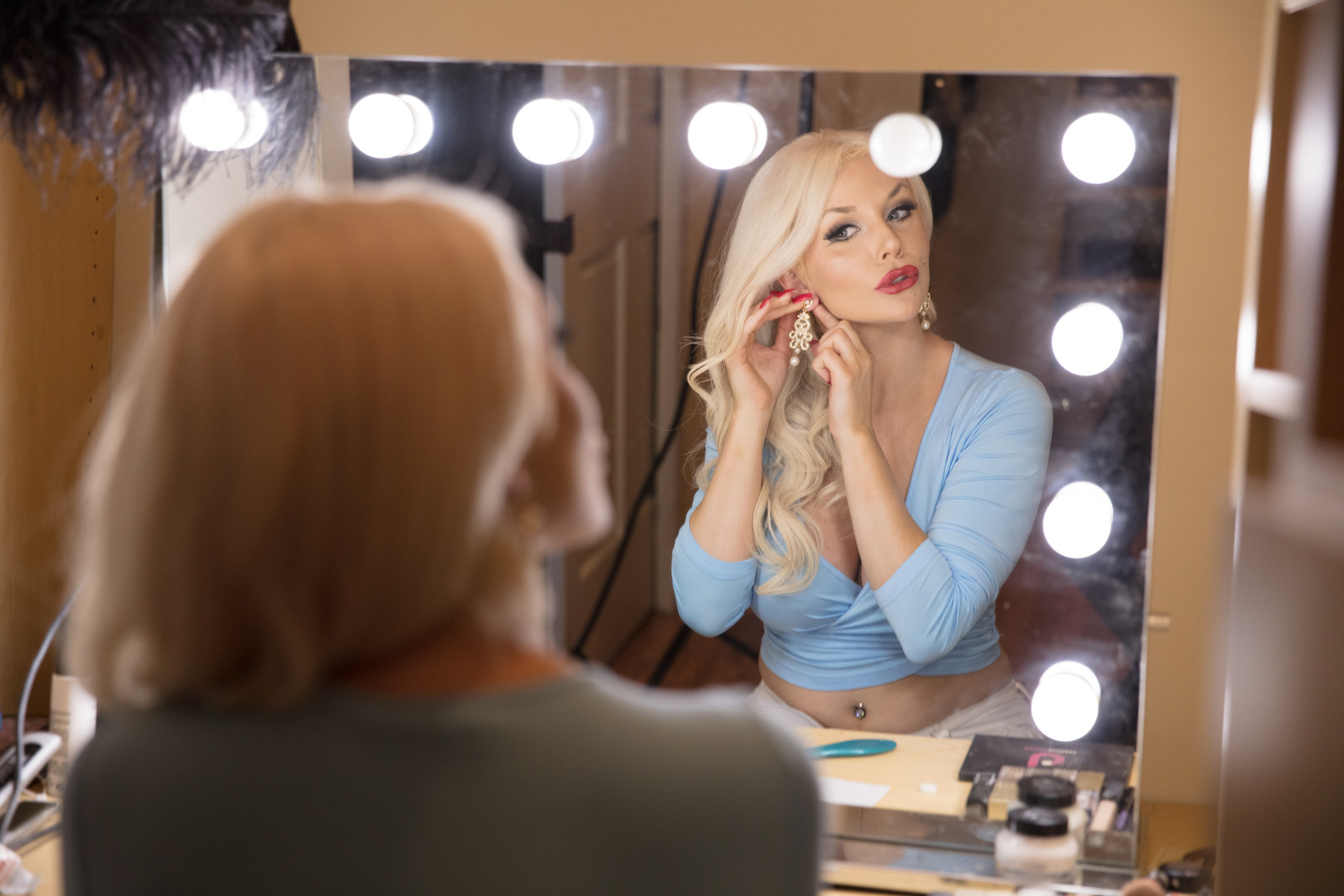
In many ways, Stodden doesn’t seem all that different than she did in 2011. She still looks years older than she actually is (although she seems younger in person than she does on television or in photos). Her laugh is still pitchy but bashful. Her makeup cracks when she smiles, which is often. She still resembles a life-size Barbie, with big hair and bigger boobs.
“Best decision I feel like I’ve made,” she says about her DDD-breast enhancement, emphasizing that this was her decision, for once. Maybe what’s changed is less about her and more about the rest of us, and how we respond to her. Or maybe it’s just that she’s a legal adult, free to do whatever she wants with her body, career, and relationships.
Stodden has chosen this moment to not only embrace feminism but fashion herself into a kind of feminist figure, too. Between sexy photos of herself, she tweets and Instagrams about social justice issues, #MeToo, and the sexual assault and harassment she’s had to deal with. “As a survivor of sexual assault, I cannot help but to tell Roseanne Barr to to [sic] FUCK OFF!” she tweeted in March, after Barr mocked #MeToo movement.
Last summer, as Ember, she released a song called “Me Too.” In a spoken-word portion of the song, she says, “I was too afraid to come out in time because I was threatened, I was scared, I was really young, so now it’s past the statute of limitations and he gets away free. Uh, so does the other one.” But, she adds, “I’m stronger now and I’m certainly not going to let this overpower me anymore.”
Stodden recently moved in with her boyfriend, Chris Sheng, who at 39 is still much older than her, and is, like Stodden, also currently going through his own divorce. “I jumped from Doug to him,” Stodden says, not the only time she speaks somewhat dismissively about this man she says she loves. Sheng, though acting as Stodden’s manager for the time being, claims that he isn’t taking any kind of financial compensation for “helping her out,” which appears to mean responding to media requests like mine over email, ferrying her to meetings, and advocating for her with music producers.
Beyond the age difference, there’s still clearly some uneasiness in the relationship. “We fight over Doug,” Stodden says. Despite the fact that she’s going forward with her divorce, Stodden isn’t sure whether or not she’s actually just meant to end up with Hutchison. Which is awkward, but acceptable, for Sheng. Hutchison, meanwhile, has given interviews claiming that Stodden has told him she’s not in love with Sheng, saying, “He is in for a huge and painful loss.”
“She’s still trying to figure out emotionally what that is,” Sheng says, turning to Stodden. “He was like your dad and also your husband. You’re so mature and also you’re still 24 and still figuring things out.” This conversation is so uncomfortable for Stodden that she resorts to whispering answers to my questions, too shy to ask Sheng to leave the room. (I ask him to do so instead.) When I tell her she seems uncertain about the long-term viability of her relationship, she leans in and whispers, “Do you think I’m not sure?”
“I’m so ready to not live for men anymore. That’s primarily what’s held me captive.”
What’s abundantly clear is that Stodden still needs — and seeks — approval from someone. It’s most obvious when she talks about her body. She tells me she’s happy to be carrying a few extra pounds, yet asks Sheng if she looks fat from time to time during our conversation. “The thing that really makes me feel bad is when I lose the weight and people tell me how good I look,” she says. “I’m just so sensitive.”
Stodden tells me that what she really wants right now is to be alone. “I’m so ready to not live for men anymore. That’s primarily what’s held me captive, is finding that approval from my father and men,” she says. But she’s not sure she’s capable yet of doing it.
As much as Stodden says she wants to change the way she relates to men, it’s hard to ignore that her relationship with Sheng started out with a lie. When they first started going out, he fabricated his net worth and burned through his life savings while taking her and her friends out in LA. “I was trying to impress her,” he says. “I’m an insecure person by nature.”
Here, Stodden jumps in: “I’m attracted to insecure men, I think.”
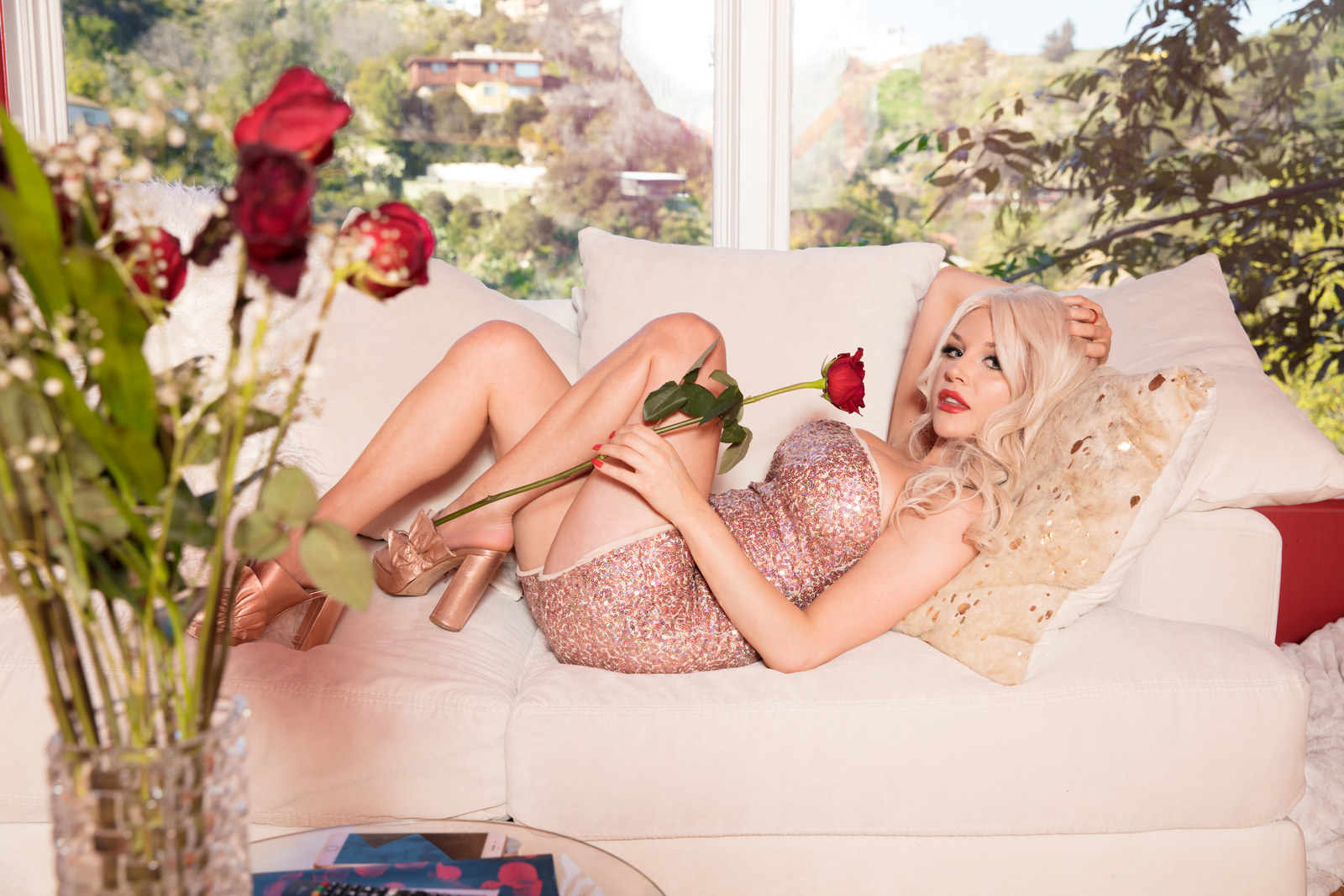
Sheng and Stodden are standing on the patio outside the bedroom they share, and she looks at him now and then to prompt him to tell the truth: “Do you want me to say it?” she asks him. “Be honest.” Each time she does this, he looks like a boy being shamed by his mother, and there’s a sudden power reversal between the two of them. When they first started dating, Sheng was so committed to maintaining the lie that he was rich and successful that he exhausted his six-figure life savings “in about a year.” Stodden says she had no idea he didn’t have the money he was blowing on her. “I should write a song about you,” she tells him.
Sheng meekly rubs his hands together. “She’s got something, I’ll tell you,” he says. “She just gets men to be able to give her whatever. She doesn’t even ask for it.”
“I don’t do that,” Stodden says quietly on the patio, perched on a pink chair, pulling her knees up to her chest. “I really don’t.”
Sheng’s comments are eerily similar to what Hutchison has said about Stodden in the past, about how much he sacrificed to be with her, as if there wasn’t a second option where he could have just left her alone to begin with. “My agent dropped me, my manager, and I was blackballed by casting directors. My family excommunicated me,” Hutchison told the Daily Mail in 2018, after he and Stodden separated. “We liken our relationship to Marilyn Monroe and Joe DiMaggio.”
Stodden’s mother talks about her in a similar way, as if Stodden is uncontrollable. “I could’ve stopped it,” Keller told me about the marriage. “I could’ve said no. But Courtney’s got a mind of her own. She’s a very strong-minded girl. She does the things the way she wants to do them.” She was, again, 16.
Most of the adults in Stodden’s life have seemed happy to brush off any accountability when it comes to her, painting themselves as merely cogs in her manipulation machine. “Courtney made me do it” is a lot easier to say than contending with being a man who courts a woman decades younger than him through lies and an unequal power dynamic. So it’s no wonder that Stodden feels near-constant, hard-to-manage guilt.
“I never really had the chance to try to fix myself."
She worries she’s been a bad daughter to her father, that she isn’t sexual enough for her boyfriend, that she’s hurt her ex-husband. She frets about both consensual sexual attention she gets from men and the impact of her assaults, often in the same breath. She can’t enjoy the company of men without feeling anxious that they’re going to hurt her — or worse, to her, that she’ll hurt them.
“I feel guilty for these guys. I guess because I feel I invited it in. You invite it on, you play, you feel good, you’re getting the attention, but then you’re being preyed upon, and you don’t realize that until after the fact,” she says.
That struggle — swinging, mentally, between feeling like prey, or like predator — is fraying her. When she talks about Sheng, for instance, she oscillates between love and pity. “Poor Chris. He thought he was going to get in a relationship with this hot young celebrity who’s all sexual and fun,” she says. “He gets in there and I don’t have sex, I’m a mess, and I’m crazy.” She throws her head back and laughs the same laugh she delivered on ABC News years before.
And when it comes to Hutchison — who, it’s good to remember here, is now 58 years old and had lived through two marriages and an entire lifetime before he even met Stodden — her guilt is profoundly deep. Hutchison made a choice to court and marry a teenage girl; any consequences he’s suffered because of that, to me, are reasonable. Yet she frets about him constantly, how he lost his family and career because of their union. “I take responsibility for it,” she says. “I don’t want to continue hurting people along the way. I’ve hurt him a lot.”
The reasons for their split are complex, and Stodden is unable to point to any single thing, though she suggests that part of it was that she just couldn’t be 16 forever, and that she maybe didn’t have enough experience to be married so early. “I never really had the chance to try to fix myself,” she says.
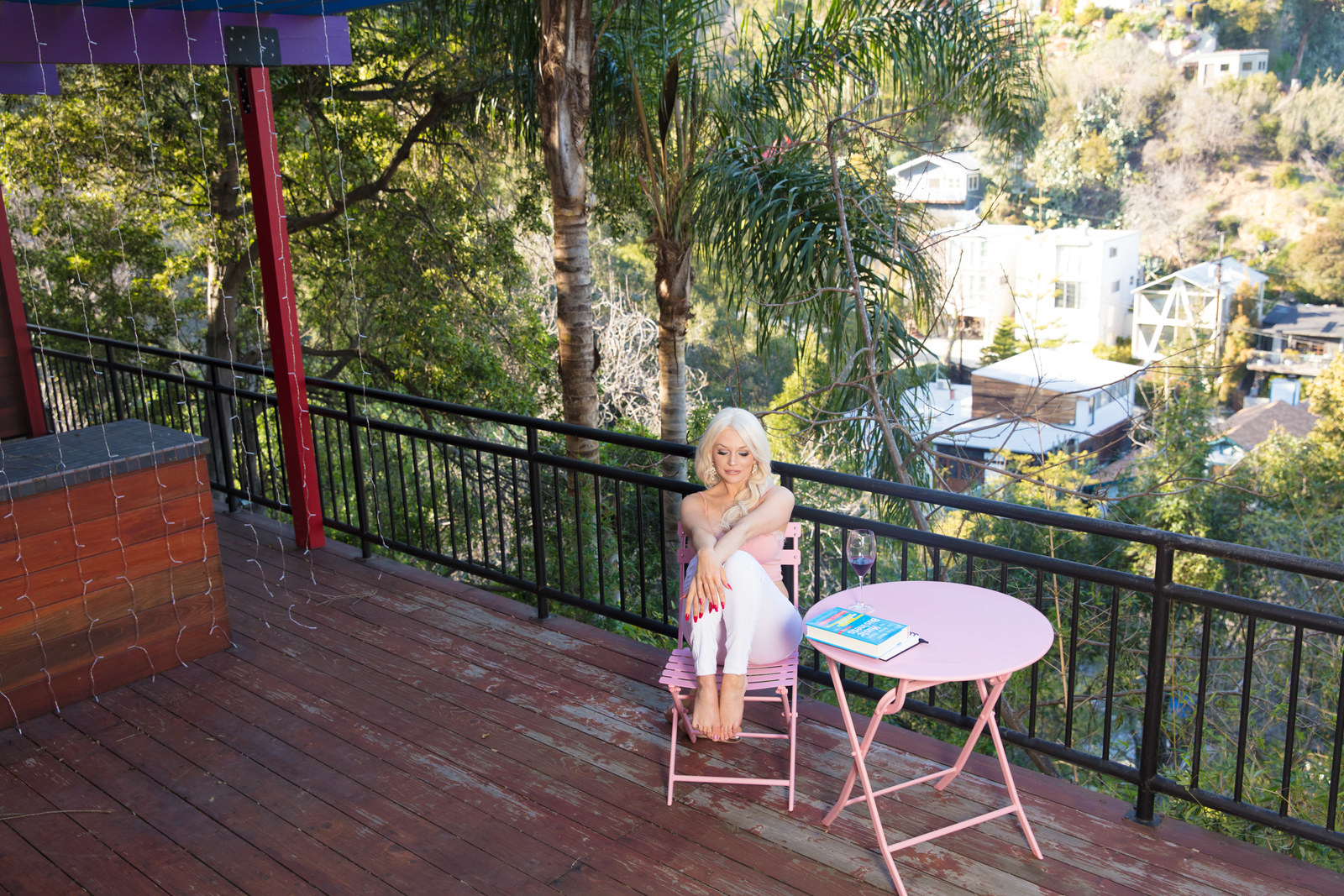
I have spent the better part of an afternoon with Stodden and Sheng at their house, but by early evening, Stodden has to go to a nearby music studio to work on her latest track, “Hot & Juicy.” Before we go, she changes from the outfit she was wearing while we talked — a white, knee-length dress and nude Louboutins — into tight jeans, tall black boots, and a skimpy black top with spaghetti straps. Once we get to the studio, she sits with her long legs on Sheng’s lap. She and her male producer talk about the vibe for her new songs (mostly having fun and being fun), and I watch as Stodden shifts from the sad, thoughtful version of herself she presented to me earlier to a flippant, self-effacing alter ego: stupid, silly, funny, sexy.
The change is jarring. Now, her giggling is constant and her voice becomes more childlike. She shakes her breasts and her eyes dim a little, as she squints through her thick brush of false lashes. She puckers her mouth like she has done through so many TV appearances, the buxom blonde on a producer’s couch. “I don’t know who I am as an artist,” she tells the producer, which seems totally at odds with what she’s told me all day: that she absolutely knows who she is, and she just needs the space to go and become that person.
Stodden also suddenly seems insecure and anxious — perhaps intentionally — and tries to stop Sheng from playing a brief clip of “Hot & Juicy.” It’s a fun club jam, a total delight, but she suddenly seems embarrassed by it, asking me not to report too much about it since it’s still a work in progress.
The producer tells her it’s great. “So stupid!” she says, giggling and shimmying her shoulders. This version of her reminds me of the story about Norma Jeane becoming Marilyn with that red sweater. Who knows if the sex symbol version of Marilyn was honest, or if it’s what she actually wanted to be — it certainly seems to be what finally crushed her.
But how can you blame a girl — a woman, now — for going back to the thing that’s always worked for her, the only kind of power she’s ever really had? ●
